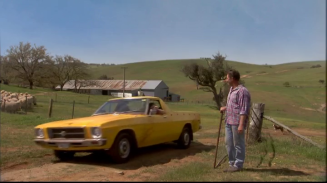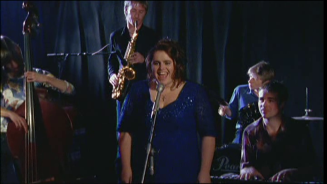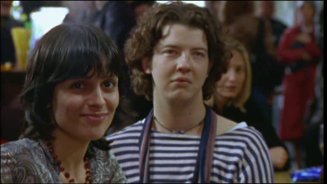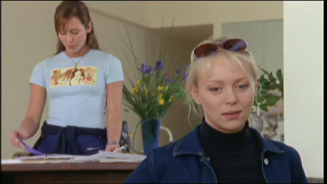This post contains spoilers for the Veronica Mars movie, along with gratuitous Dandy Warhols lyrics because that’s compulsory for VMars posts now.
I was a Veronica Mars fan without being in the fandom. By the time it aired in Australia, it was already in its second season in the US, and I knew, without being spoiled, that disappointment lay ahead. I actually enjoyed the second season, probably because my expectations had been lowered, but I bailed part-way through season 3, partially because I found the mysteries unengaging, but mostly because I was sick of Logan.
So when the Kickstarter appeared last year, I was intrigued, but not inclined to give it actual money. (I was, however, quite disappointed to discover that there was only one cinema screening in Melbourne — and that was sold out before I knew it was happening.) But through the miracle of simultaneous worldwide digital releases, on Saturday night I sat down to catch up with the residents of Neptune, California.
I didn’t hate it. I’m not sorry at all that I spent an evening watching it. But days have passed, and I keep coming back to its storytelling choices and going, “…Really?”
A few weeks ago, I said on Twitter that the only thing that would make this movie work for me is if Logan is totally guilty, and it ends with Veronica watching stoically as he goes to prison. Alas, saying things like, “This will only work for me if…” never ends well. It was clear from the first round of publicity that this wasn’t going to be that movie.
On Saturday night I tweeted, “I wish the VMars kickstarter had had a level where the reward was a movie without Logan.” But that’s not fair. In the TV series, when it was at its best, Logan was an interesting and dynamic character. And it’s not like he was even in this movie, anyway. Jason Dohring gave a perfectly performance as Stepford Logan, bad boy turned air force hero. And that was fine and all, except for the complete lack of tension — sexual or otherwise. Is Logan guilty? Not for a second. Are he and Veronica going to hook up? Yep. Does anyone who’s not a long-standing LoVe shipper care? Well.
(Things I hold against Logan: not only did he hijack the series to a considerable extent, but his name comes first in the pairing portmanteau. Sure, it’s cute, but it’s kiiiiind of symbolic of the way Logan, and Veronica’s romantic relationship with him, became the show’s albatross.)
So Logan has abandoned his rich jerk lifestyle to become a naval pilot/JAG officer (obligatory comment about his ill-fitting uniform here) who allegedly engaged in dogfights with the Taliban. (We hear so little in the media about the Taliban’s air force! Why is that, I wonder?)
I double checked with Google, and the only dogfighting in Afghanistan is the kind that involves real dogs, which is apparently undergoing a resurgence in popularity. And while that doesn’t seem beyond the kid who organised fights between homeless guys, I don’t think it’s what we’re meant to be thinking. Nor are we meant to be thinking that Logan has been dropping bombs on civilian populations, I suppose, because being in the military is supposed to be a sign that he’s respectable now.
(Obligatory statement of ambivalence towards military organisations in general and the US military in particular.)
It’s a real shame to see Logan go from Homme Fatale to Woobie, but that’s what happens when you love a character too much. Well, you love a character and you don’t to piss off the shipper-heavy fanbase that just paid for your movie. And it’s not really a surprise, because this started well before Kickstarter even existed. (This is a good article about the problem of Logan.)
It’s more disappointing to see Logan’s partner-in-douchebaggery, Dick Casablancas, being equally softened. Sure, he’s still a sexist jerk, but the script goes out of its way to prevent him from being a suspect in the crime-that-triggered-the-crime-that-starts-the-movie.
In fact, the ultimate guilty party is a kid from the wrong side of the tracks who didn’t know his place. And that doesn’t sit right. “When the class war comes, Neptune will be ground zero,” says Veronica in the rather stilted opening montage. So it’s kind of awkward that the two rich white dudes are above suspicion, and we’re left with the “total trailer park weirdo” as the criminal. This could have been interesting, setting him up as a foil to Veronica, another outsider who observes and critiques the corruption of Neptune’s stratified society. But it all falls flat.
I also have problems with Weevil’s subplot, not so much that he doesn’t get justice — it’s noir, after all — but because he gets four scenes, and the last one is just a glimpse of him riding with his gang again. Is he seeking justice on his own terms, or has he given up? What has happened to his family? It’s a problem that we don’t know. People are suggesting that this is all going to be answered in some form of spin off or sequel, but so far, the next entry in the Veronica Mars franchise looks like a webseries about … Dick Casablancas.
This is particularly sad because Rob Thomas says good things about class and race and injustice. But the actual movie isn’t quite there yet.
And what of Veronica? We end the movie with her abandoning her career in law and moving back to Neptune to continue her work as a PI and her relationship with the new, cuddly Logan. At first I liked this — the career move, not the relationship — but it’s feeling increasingly like a step in the wrong direction. It’s all very well for Veronica to mock the school bitches for reliving their glory days in high school, but look who’s going back to her after school job?
Meanwhile, she has a law degree. Sure, it would take some work to pass the bar in California when she’s been studying for New York, but it’s not impossible. And we already know she’s quicker and smarter than the attorney working for her father. Veronica Mars, Attorney at Law. An ally to her father, rather than an employee.
All in all, this felt like a high school reunion, and not in a good way. Decade-old in-jokes and too much time spent with dickheads, not enough time with your actual friends. I suppose we’re lucky that we didn’t catch up with the student played by Paris Hilton. Though at least I remembered who she was.
One good thing, though, the movie really has me wanting to watch the series again. And who knows, maybe this time I’ll finish season 3.






